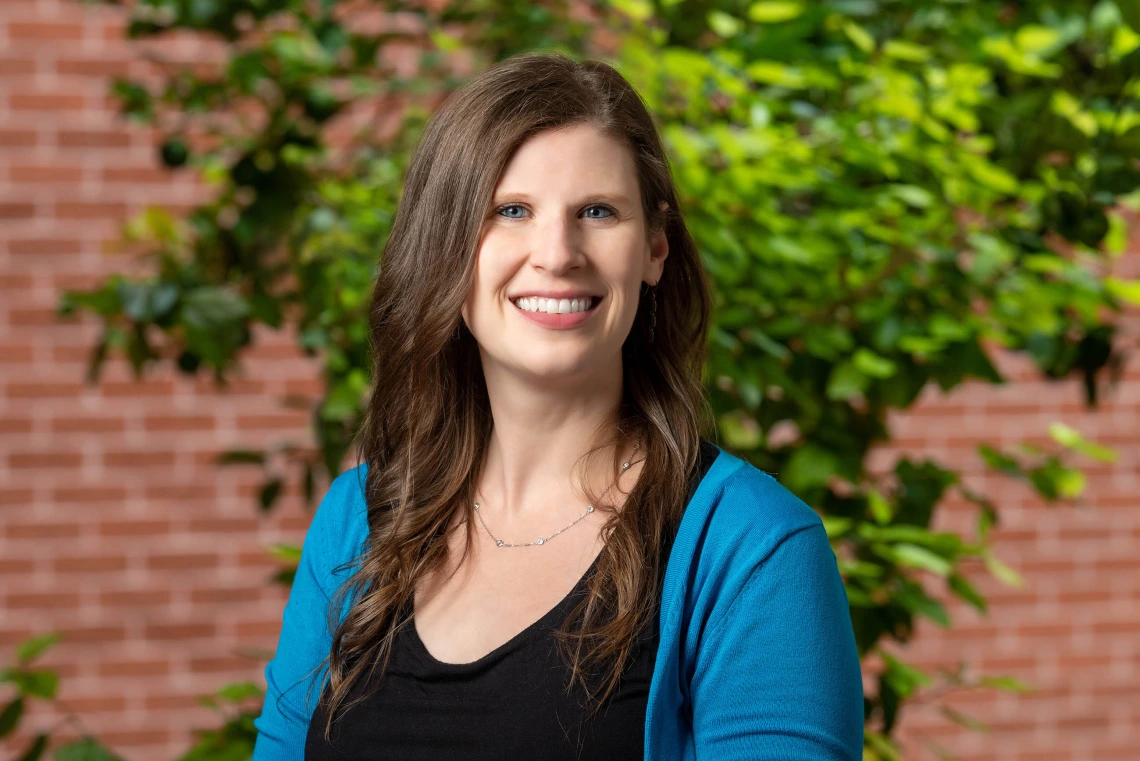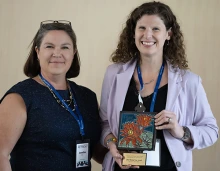Empowering Cancer Survivors: Fox recognized for innovation in behavioral cancer care


Jen Bea (left) pictured with Rina Fox and her Rising Star award.
In April, Rina Fox, PhD, MPH, assistant professor and member of the University of Arizona Cancer Center, was awarded the 2025 Rising Star Award by the center’s Cancer Prevention and Control Program (CPCP), led by Jennifer Bea, PhD, and Heidi Hamann, PhD, during their annual retreat at the Andrew Weil Center for Integrative Medicine, which focused on collaboration, innovation, and recognition.
Fox, who joined the College of Nursing in 2021, received recognition for her groundbreaking work in developing behavioral and psychosocial interventions to improve the quality of life for individuals diagnosed with cancer and their caregivers. Terry Badger, PhD, RN, PMHCNS-BC, FAAN, FAPOS, Eleanor Bauwens Endowed Chair, serves as a professor and Interim Associate Dean of Research at the College of Nursing, nominated Fox for this award.
“Dr. Fox’s strong commitment and service to the psychosocial oncology profession contribute to her emergence as a leader deserving of this award,” said Badger. "Her dedication to advancing cancer care through research and mentorship is truly inspiring.”
“Dr. Fox exemplifies our college’s mission by combining scientific innovation with genuine compassion to improve lives. Her groundbreaking research on behavioral interventions for cancer survivors not only advances the field of oncology but also highlights the importance of integrative, patient-centered care,” said Brian Ahn, PhD, dean of the College of Nursing. “We are incredibly proud of her recognition and look forward to the ongoing impact of her research, mentorship, and advocacy within our community and beyond.”
Fox’s research has been widely recognized for its innovation and impact. She holds a Mentored Clinical Scientist Research Career Development Award (K08) from the National Cancer Institute, a Level 1 grant from the Institute for Mental Health Research, and funding from the Department of Defense. Her K08 project explores novel, more accessible ways to address sleep disturbance among gynecologic cancer survivors, an issue reported by over 80% of this population. This work aims to enhance health-related quality of life by addressing both sleep and circadian rhythm disruptions through behavioral interventions that are more acceptable and feasible for survivors.
In addition to her research, Fox has published 73 peer-reviewed manuscripts and has earned honors from the NCI Division of Cancer Prevention, the Society of Behavioral Medicine’s Cancer Special Interest Group, and the Tucson Hispanic Chamber of Commerce. She is also deeply committed to mentorship, guiding young scientists within the College of Nursing and fostering the next generation of cancer researchers.
Along with her work in sleep and cancer, Fox currently leads a line of research focused on eHealth interventions, digitally delivered stress management skills training for young adult cancer survivors. This project, funded by the Institute for Mental Health Research, further highlights Fox’s commitment to promoting accessible, patient-centered care.
Fox’s influence extends deeply into the Tucson community, where her research has driven forward-thinking approaches to cancer survivorship and fostered new avenues for collaboration and mentorship. She is a trusted advisor to nursing, psychology, and public health students, inspiring them to embrace empathy and equity in their healthcare pursuits. Through her leadership, mentorship, and advocacy, she consistently supports and elevates others, transforming her achievements into meaningful opportunities for those with whom she collaborates. As the U of A Cancer Center continues to lead in cancer prevention and care, Fox’s recognition as the 2025 Rising Star affirms the transformative potential of integrating behavioral science into oncology. Her trajectory reflects scientific excellence and a deep compassion for the communities she serves.
The Rising Star Award and increasing national recognition highlight Fox as a leading figure in the next generation of cancer researchers. She is visionary, compassionate, and deeply committed to advancing integrative, patient-centered care. Her work effectively bridges the gap between science and humanity, providing hope and healing to those affected by cancer while inspiring a new wave of researchers to follow in her footsteps.

